How much do parents really matter?
A new book, Do Parents Matter? by Robert LeVine and Sarah LeVine, will be published in the UK next year. It was previewed in The Times last week (29 October 2016, summarised below), and it sounds really interesting. After almost five decades of research, the authors, both acclaimed anthropologists, say parents have far less influence than we think, but they do stress two things parents can do to ensure their child is happy and healthy.
The book’s purpose, arguably, is to reassure. Parents these days are bombarded with advice on what they should and shouldn’t do to raise healthy and well-adjusted children. They are often made to feel they are falling short in some way – being a parent can be a role filled with anxiety.
So, Do Parents Matter? The authors conclude that yes, parents do matter, but not as much as we would think.
The couple have spent their working lives looking at parenting practices across the globe. Children can be happy in a variety of conditions, ‘not just the effort-intensive, cautious environments so many British and American parents drive themselves crazy trying to create’ they say in their book.
In other societies, parenting practices that we in the west would regard as neglectful or even cruel can still result in happy and healthy adults. For instance, many western working mums feel guilty about leaving their children in nurseries or with childminders. Yet communal childcare is the norm in other parts of the world; in some places, toddlers are routinely sent away by their mothers after weaning and taken care of by their grandmothers and other women.
In the UK and America, parents engage toddlers in discussions about what food they would like to eat or what clothes they would like to wear. Elsewhere in the world, parents teach their youngsters to follow commands without talking back, the first step in learning about obedience and respect.
Whilst western parents tend to cosset toddlers and try to shield them from the nasty parts of life, in other parts of the world parents believe children’s development can be helped by these things. The authors tell the story of a three-year-old Inuit girl living in the Canadian Arctic. Although the girl was loved and well taken care of by her parents, they constantly challenged the child with extreme, adult questions like ‘Why don’t you die so I can have your nice new shirt?’ This is seen as an Inuit strategy to get children to realise that life is uncertain and capricious, and that they will have to work through a lot of conundrums. The authors don’t suggest anyone does this, but include the example to show that there is a huge variety of ways to teach children about moral relationships.
Another contrast is around responsibility. Modern western parents don’t give children a lot of responsibility, believing that early childhood should be play-based. In Africa and Latin America, however, children aged five or six might be expected to care for a baby or herd animals; in the Pacific islands, three-year-olds are given scaled-down machetes and at five carry heavy loads of firewood.
The LeVines’ message is that children usually turn out fine, whatever the expectations placed on them and the contexts they grow up in. They do, nevertheless, identify two behaviours they see as essential for raising well-adjusted children:
- physical affection, whether from a parent or other responsible adult, and
- confidence to know that they are the grown-ups and whilst they may not always know best, they do know better than a child.
04 November 2016
The homework this week is practice makes perfect and is due in on Thursday 10 November.
I can show what I have learned about the 2 times table.
In maths lessons this half-term, we’re learning about multiplication and division. We’ll be looking at the 2, 5 and 10 times table. This week, we’ve focussed on the two times table. Children should complete the worksheet in the book.
They could also do something creative to show their understanding of the two times table.
Finally, remember that Mathletics is a good way for children to practise their maths at home.
04 November 2016
Here are the spellings for this week. They will be tested on Friday 11 November.

‘sat’ or ‘sitting’…?
Yesterday, we received this email from Elle Wild, author:
I am home schooling my child, who is in Year 4 in Canada, and have been following your very useful notes for Moortown school to keep my son on track with the UK curriculum, as he was schooled there for the last 4 years.
I just wanted to give you a heads up that you’ve included a grammar error in your homework for Nov 4th.
The sentence should read, “My cat is seated on the sofa”, not “is sat”. The cat sits, the cat is seated, the cat sat, but the cat should never “be sat”. It’s a confusion of present and past tense.
I hope you won’t mind the comment terribly, and please permit me to say that I am very impressed by the careful planning evident in your weekly reports.
We’ve replied with the following:
Thank you for your email. In particular, thank you for using our site to support the home education of your son. The grammatical issue to which you refer is quite a tricky one, in that it is becoming more and more wide-spread, and I’m sure you’ll know that language is an ever-changing thing!
Part of the cause here is that Moortown Primary and most of the staff are from the north of England (Moortown is in Leeds), as raised here. To exacerbate this, the teacher in question – who’s a fantastic teacher, and one who is passionate about grammar, providing professional development for staff in other schools – is from the north east (not quite Geordie, but heading in that direction), a point raised here. And it may also relate to the deeply embedded class system, ‘sat’ being more working class, as noted here.
That’s not to say you weren’t right in highlighting this to us because of course you’re completely correct here. We do like to be accurate and this will certainly provide food for thought!
Grammar can be tricky, but the internet is a great way to clarify confusion! One of our favourite sites is Grammar Monster.
Find out more about Elle Wild’s new book, Strange Things Done.
PS We’ve corrected the homework article!
04 November 2016
This week’s homework is creative and is due Thursday 10 November:
Design a new front cover for Charlie and the Chocolate Factory.
Make sure it represents the story but doesn’t give too much away!
04 November 2016

Be bright, be seen
Now the clocks have gone back, here is some safety advice from the Child Accident Prevention Trust.

Visibility is a key issue all year round, all day round, whether children are walking or on their bike. However, over the winter months, it is especially important as the school day can start and end in twilight.
During term time, the majority of child road accidents happen in the afternoon and evenings, especially in the autumn and winter when it gets dark earlier in the day.
The general principles of being visible to motorists are:
- During the day, bright and fluorescent clothing is best.
- At twilight and night time, reflective clothing or tape that is picked up in car’s headlights is best.
- It is against the law to cycle at night without a white front light, a red back light and a red reflector at the back.
- Always choose routes and cross at places that are well-lit.
- Where possible, cross the road at a pedestrian crossing
- The message for pedestrians and cyclists is to wear bright clothing during the day and reflective clothing or accessories after dark.
Drivers should be especially careful around schools and mindful of their speed when visibility is poor.
Woodwork
Work has begun on making our frames that will showcase the Quentin Blake artwork completed before half term. Accurate measuring, complete concentration and staying safe were some of the skills need for this activity.
Well done to Aina, Pia and Danny who were experts at sawing and helping others. Great for building muscles!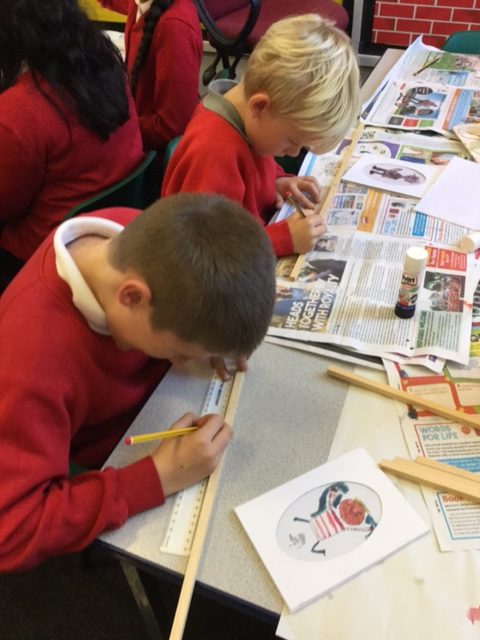

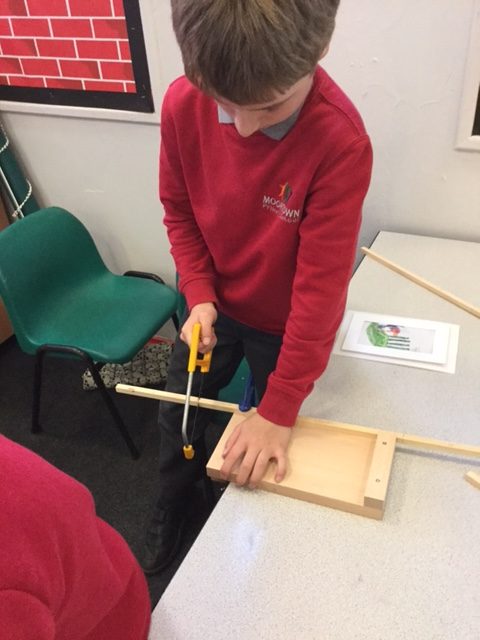

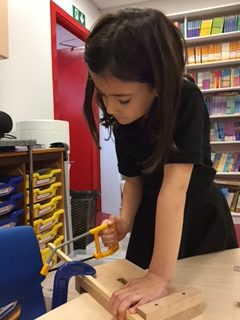
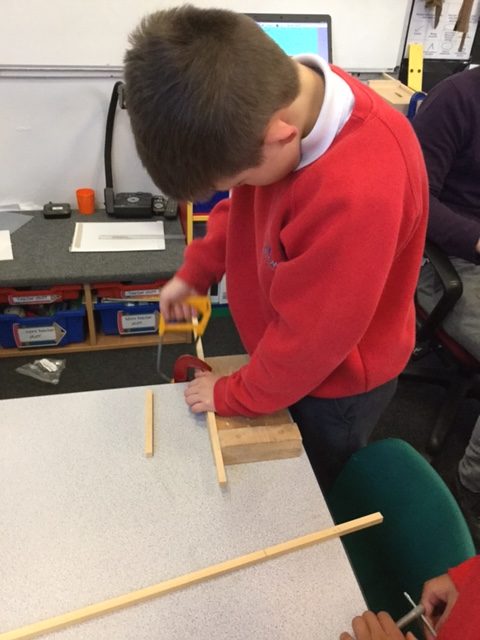
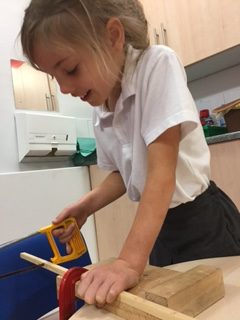
04 November 2016
For this week’s spellings, we recap learning from earlier years as we focus on plurals – more than one of a noun. Children should practise spelling these words in preparation for a test on Friday 11 November.
Children will be tested on 10 of these words (but should know them all).
I have given the singular version. Children should learn the plural version. For example:
- one bus / two buses
- one baby / two babies
| bus |
| cup |
| baby |
| balloon |
| sheep |
| party |
| child |
| lunch |
| worry |
| cactus |
| duck |
| stimulus |
Please remember what we discussed at parents’ evening: “It is much more important that children learn the rules than simply the correct spellings.”
04 November 2016
We have two pieces of homework this week, both due on Thursday 10 November 2016.
The first is creative:
Why is maths important?
This a broad question and could be interpreted in many ways, hence the fact it’s a creative homework.
Children could:
- Talk about how adults they know use maths every day
- Research a key moment in history and explain why maths how maths played a part in this
- Make a photo collage of examples of maths in everyday life
- explain why maths is important
The second is using a program called IXL (it’s a bit like Mathletics). Each child knows their login and they should complete the activities relevant to them – the ones on their homework slip.
Some children should complete the following activities (click on the links or visit the website):
- HH.1 Commas with direct addresses and after introductory words
- D.4 Identify nouns – with abstract nouns
Other children should complete these activities:
Please note: a ‘run on’ is another term for a squashed sentence – your children know all about these!
If you have any problems accessing IXL please do not hesitate to ask me early next week.